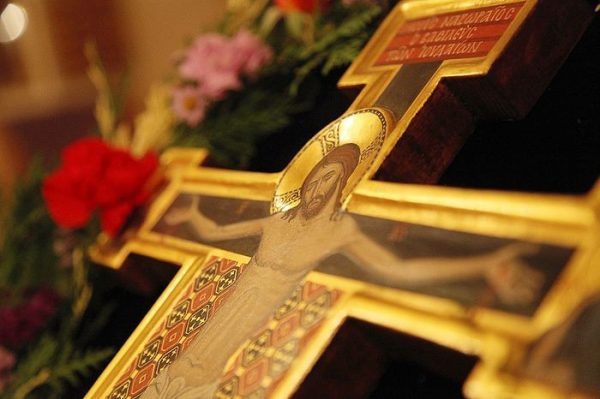Around mid-September each year, the worship of Orthodox Christians resounds with the hymn: “We venerate Your Cross, O Christ, and we glorify Your holy Resurrection.” Chanted many times, this hymn highlights the celebration of the great feast of The Exaltation of the Holy Cross on September 14th/27th. Exaltation means “lifting up.” We lift up the Cross as the emblem of the Christian faith. Patriarch Sophronius of Jerusalem lifted up the actual Cross of Christ many centuries ago after it had been recovered from the Persians. In a splendid festival in Jerusalem, and as depicted in the festal icon of September 14th/27th, Patriarch Sophronius lifted up the Cross while the faithful sang hymns of praise and joy.
The Cross is the foremost symbol of Christianity. It is so important in Orthodox life and thought that we celebrate its significance in September three times sequentially. Today is the “Sunday Before the Cross,” then on September 14/27 we celebrate the main feast, and on the following Sunday we observe the “Sunday After the Cross.” Why all this attention to the symbol of the Cross? Because it refers not to any of thousands of crosses used by the Romans to crucify rebels and brigands, but to that single Cross on which Christ was affixed and died. When we lift up and venerate the Cross, we signify and worship the death of Christ as an eternal sacrifice for the forgiveness of sins. Christ is our expiation, our atonement, our reconciliation and peace with God. When we lift up and honor the Cross, we honor the crucified Christ who offered His life on the Cross as the ultimate gift for the salvation of the world.
Among the achievement of modern science is the analysis of the DNA, the human genome, by which we now acknowledge the remarkable biological unity of the human race. Whatever the racial distinctions and the diverse geographic locations where human beings flourished, whether in Africa, Europe, Asia, the Pacific Islands or the Americas, we all make up an astounding unity biologically. This scientific finding supports and illuminates a profound truth always taught by the Bible and Christian theology: that men and women share a common humanity whatever their race, background or physical characteristics. We are one human family of which the ultimate author and creator is God.
But this marvelous DNA human solidarity has never translated into peace and harmony among humans. The biological unity has never brought about a comparable social and political unity. On the contrary geographical separation, distinctive physical traits, different cultural traditions, and not least an endless passion for domination and exploitation of others, have caused constant friction and division in the human family throughout the ages.
This weekend*, as we continue to process the humiliations of our defeat in Afghanistan, and to deal with the resurgence of the deadly corona-virus, we also commemorate 9/11/2001, the great tragic milestone of American and wider human history which marks the sad beginning of the twenty first century. We memorialize the victims of 9/11 with deep respect and love. We thank and honor the countless first respondents and security personnel. We also contemplate the aftermath over twenty years. What has resulted from our nation’s righteous anger over the loss of more than three thousand lives? The bitter result was the madness of hugely increased violence in the world, causing hundreds of thousands of dead in the Middle East, including nearly twenty thousand American lives, and hundreds of thousands of those wounded physically and mentally. Add to that terrible tally the suffering of millions of refugees and the incalculable cost in dollars. Are we better off today? Surely not. Part of the aftermath is a divided nation, polarized over issues that could properly be worked out by people of good will. But good will appears to be in short supply. Lord, have mercy!
Nevertheless, this morning’s Gospel is good news for those who desire good news from God. Most of us cannot influence world events. But we can shape our own lives in family, marriage, friendships, parishes and local communities. There is an abiding truth, an eternal hope, a divine vantage-point from which to view and negotiate the human project. It’s about God’s sacrificial love revealed in the Cross of Christ. “For God so loved the world that He gave His only Son that whoever believes in Him shall not perish but have eternal life.” This good news of God’s word does not provide detailed solutions to humanity’s problems. What it does provide is the foundation of truth and the power of God’s grace by which people can creatively work out solutions appropriate to their common humanity and dignity. The key text of John 3:16 is one of the shortest expressions of the Christian gospel: “For God so loved the world that He gave His only Son that whoever believes in Him shall not perish but have eternal life.”
Whom did God love? God loved the world, the whole world, the whole human family. God loved not only the Jews, but also the Greeks, the Romans, the Egyptians, the Syrians, the Russians, the Turks, the Americans, the Chinese, the North Koreans–the whole world. God holds all people as His beloved children. They are all precious to Him. To be sure, God first chose Israel, not merely for itself, but to be a light to the nations, to be witness and to show the way to God’s love and righteousness. Then God also chose the Church, through the person and ministry of Jesus, not only for itself, but as a universal light of God’s love and righteousness. God’s plan is to draw all people to Himself in Christ through the life and witness of Christians everywhere. This is the holy burden and the marvelous challenge of all Christians. We may be separated according to diverse churches and denominations, but we ought to be united in heart and mind, fulfilling the Lord’s words: “By this people will know that you are my disciples, if you love one another” and share that love with others (John 13:35).
“God loved the world.” Why? Why did God love the world? A visitor from outer space, looking at all the conflicts and disunity of humanity, seeing its cruel trials and evils, would perhaps not regard humankind as lovable at all. But God, the true and living God whom we know in Jesus Christ, the God to whom we pray and address as “Our Father who art in heaven,” most assuredly loves the world. He does so because of His own character which is defined by selfless love. We read in the Scriptures: “Beloved, let us love one another; for love is of God, and those who love are born of God and know God . . . for God is love.” (1 Jn 4:7). And again: “God is love, and those who abide in love abide in God, and God abides in them” (1 Jn 4:16). In other words, love is the essence and source of life that comes from God. Whoever truly loves is in spiritual communion with God. Whoever truly loves affirms and shares in the very existence of the living God, the ground of all true, selfless love.
“God so loved the world that He gave His only Son.” How much did God love the world? So much so that He gave His only Son. Nothing was more valuable to God than His eternal Son–our Lord Jesus. At His baptism, God said: “You are my beloved Son” (Mk 1:11). At His transfiguration, God said: “This is my beloved Son; listen to Him” (Mk 9:8). At the crucifixion, the Roman centurion cried out: “Truly, this man was the Son of God” (Mk 15:39). God gave as a precious gift to the world what was most valuable to Him, because of the magnitude of His love for us. “God has shown His love for us in that while we were yet sinners, Christ died for us” (Rom 5:8). In Jesus we have the greatest expression and most persuasive example of what God’s love is all about. “In this the love of God was shown among us, that God sent His only Son into the world . . . In this is love, not that we loved God (first) but that He loved us and sent His Son” to us (1 Jn 4:9-10).
What was the purpose of God’s love in sending His only Son to the world? God’s love is purposeful; it has an aim and a target, all motivated by love. “For God so loved the world that He gave His only Son to the world that whoever believes in Him shall not perish but have eternal life” (John 3:16). God’s purpose is to rescue humanity from its trials and self-inflicted evils, its divisions and cruelties, and bless it with abundant life grounded in God’s love. Life and death. Light and darkness. Grace and sin. These indeed are the ultimate polarities that define the arena of human life in its nobility and tragedy. The tragedy is that, though we share a common humanity, our fears and quarrels, our divisions and broken relationships, show that we fall far short of God’s will for us. That’s the tragic aspect of the human tragedy. The nobility is that we are still the children of God, created in His image and likeness, and are called to walk the path of God’s love toward mutual forgiveness, reconciliation, and unity–the path pioneered for us by God’s eternal Son. Christ did this through His holy presence, His words and deeds, through His death and resurrection.
St. Athanasius once wrote that “the glory of God is a human being fully alive, and true life is communion with God.” Every day is a day of decision. Human beings always stand at the crossroads. Christ calls out to us: “I am the way, the truth, and the life . . . those who believe in me, have already passed from death to life . . . I am the light of the world; those who follow me, will not walk in darkness, but will have the light of life” (John 14:6; 5:24; 8:12).
On this day of the Sunday Before the Cross, let us celebrate the good news of the Gospel: “God so loved the world that He gave His only Son, that whoever believes in Him will not perish but have eternal life.” In return let us love God and each other with all our hearts. “Beloved, if God so loved us, we also ought to love one another. No one has ever seen God; if we love one another, God abides in us and His love is perfected in us” (1 John 4:11-12).
To our beloved Lord and Savior, be honor and glory forever!
*Please note that this article was written on September 11.

















